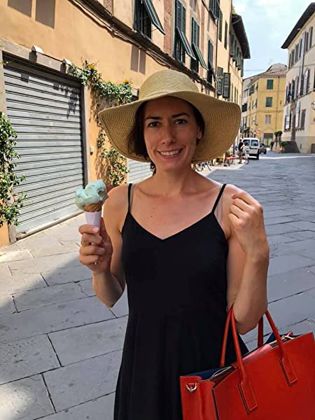
All Henri of Maron wanted was to stay with his family on his country estate, surrounded by lemon groves and safety. But in 13th century Palestine, when noble-born boys are raised to fight for the Holy Land, young Henri will be sent to live and train among men who hate him for what he is: a French nobleman of an Arab mother. Robbed of his humanity and steeped in cruelty, his encounters with a slave soldier, a former pickpocket, and a kindly scribe will force Henri to confront his own beliefs and behaviors. Will Henri maintain the status quo in order to fit into a society that doesn’t want him, or will fate intervene first?
The first book in The Two Daggers series, The Scribe takes readers on a sweeping adventure through the years and months that lead up to the infamous Siege of Acre in 1291 CE and delves into the psyches of three young people caught up in the wave of history.

Excerpt from Book 2: Chapter 12
The four Franj men stood brazenly in the throne room of the citadel, their feet and legs filthy from travel and their sweaty heads bare. A shimmer of dust fell from their tall bodies onto the fine, red and blue carpets that had been spread over the mosaiced floor. Khalil sat comfortably in his golden chair, which had been completed by his artisans only the day before. The chair separated him from his father, who often preferred to stand, until he was too frail to do so any longer. Khalil stared down at the men from his high dais, his face blank and impassive, every muscle practiced to stillness.
“Have these men been invited to wash before speaking in this council?” he asked the room in Turkish.
The assembled amirs and courtiers looked at each other nervously. A slave rushed forward and prostrated himself to the ground. “Yes, my lord, but they did not wish to bathe until after they had spoken to you. They said they rode hard to come to you as quickly as possible.”
Khalil’s face remained still and unreadable, but Yusuf could guess his thoughts. Although some Franj were courtly and genteel, with knowledge of basic hygiene and manners, many were not. They were generally considered uncouth, foul, smelly, and no Mamluk – indeed no Muslim – would allow themselves to be seen in such a revolting state.
The shortest of the four, a man with a ruddy, good-natured face and a tail of dark brown hair, stepped forward and bowed.
“Honored sultan, I am Sir Philip of Mainboeuf. We bring you gifts and a plea of mercy from the leaders of Acre. We desire peace between your people and ours, which has brought prosperity into both of our harbors during times of truce. We ask that you reconsider your intentions to besiege Acre. Your father maintained good relations with our city, and we wish for the same with you.”
Khalil frowned at this.
Today, Yusuf stood on the dais at the sultan’s request in case translation was required. He wore his samite robe, belted with a black silk sash embroidered with verses of the Qur’an. Under the sash, the gold samite itched, and he willed himself to be as still as Khalil, but the urge to adjust his robes was maddening.
Khalil folded his hands over his stomach and considered the men in front of him. The silence lasted for such a long time that the Franj knights began to glance at each other, confusion muddling their sun-red faces.
“Your king did not honor my father’s request to send the perpetrators of the atrocities against Faithful when we asked.” Although the Franj had addressed him in Arabic, Khalil answered in Turkic. The faces of the Franj were changing from confidence to confusion to fear. “Therefore, I see no reason why we should return these men to Acre.”
His eyes flicked to Yusuf, who bowed. “Yusuf Ibn Shihab, please explain to these men that the gold they sent will be returning to Acre, but they will not.”
Yusuf dutifully translated, and when he had finished, there was a moment of silence. The knight called Mainboeuf stuttered out an explanation to his colleagues in French, and they immediately began to shout and gesticulate.
Khalil inclined his head, and five of his palace guards approached, their swords drawn.
“Please,” the knight called Mainboeuf begged in Arabic, “my squire is only a boy. He has nothing to do with this business. Please send him back to Acre with the gold.”
At this, Khalil stood.
“Give him mercy? How much mercy did your people show to ours when they slaughtered innocents in your streets? When they beheaded prisoners of war a hundred years ago? When they came to Jerusalem, their bellies full of the flesh of Muslims that they had consumed in their ravenous hunger? You are not men; you are animals!”
His face flushed with rage, and Yusuf could see his fists clenching and unclenching at his sides.
“Your squire will join you in chains, and I doubt that there is any gift that will be sufficient to slake my anger, which is the anger of every sultan before me! Get them out of my palace!”
He was screaming now, pointing at the door, and the five guards grabbed the Franj knights roughly. One of them, the youngest, whimpered loudly before the door slammed behind him.
Yusuf looked at his friend, who had reseated himself in his golden chair. Khalil was spirited but always level-headed and not given to bursts of emotion or anger. The man sitting on the throne seemed a stranger to Yusuf. An unknown.
***
When word reached Acre that a message had arrived from Cairo, the citizens’ council crowded into Prince Amalric’s lavish house near the harbor. As servants moved sedately among the men, their arms laden with trays of sweets and pitchers of wine, Beaujeu stood and motioned for silence, then cleared his throat.
“Well, we have received an answer from Khalil.” He held up a sheaf of papers and handed them to a small man in a black sergeant’s robe, who began to read.
“The Sultan of Sultans, King of Kings, Lord of Lords, al-Malik al-Ashraf, the Powerful, the Dreadful, the Scourge of Rebels, Hunter of Franks and Tartars and Armenians, Snatcher of Castles from the hands of miscreants, Lord of the Two Seas, Guardian of the Two Pilgrim Sites, Khalil al Salihi.”
At this elaborate salutation, many of the men in the room murmured and began to look around at each other. Beaujeu rapped the floor loudly with the butt of his baculus, and the crowd quieted.
“To the noble master of the Temple, the true and wise: Greetings and our good will! Because you have been a true man, so we send you advance notice of our intentions, and give you to understand that we are coming into your parts to right the wrongs that have been done. Therefore, we do not want the community of Acre to send us any letters or presents regarding this matter, for we will by no means receive them.”
For a moment, the room was silent. Then the messenger of the sultan stepped forward and bowed curtly, his expression hard and unsmiling.
“Your men,” he began in broken French, “we have them in our cage. They stay with us,” he raised his hand and closed it into a fist. “We not give them back.”
Amalric stood from his chair, his silver wine cup clattering to the ground. A murmur rose from the assembled city leaders and servants as the messenger raked them with a disapproving stare. He continued.
“You broke peace. Killed innocent. No more men you send to us. No more gift. We come, and we take this city. Praise to God.”
For a moment, all in the room remained silent.
“Fine,” Amalric said, his eyes blazing, “let them come. The city of Acre is strong, and so are its people. If Khalil wishes to find this out for himself, we are prepared to meet him in battle.”
Beaujeu stood slowly and walked from the room as his secretary translated Amalric’s words into fluid Arabic. The Patriarch raised his face towards heaven and closed his eyes in prayer. Brother Mathieu de Clermont pounded the arm of his chair.
“Then let us march on this madman ourselves and end him before he can come this far north!”
“Quiet, Clermont!” Amalric snapped. “They do not need more reasons to hate us right now.”
Turning to the assembled council members, he sighed heavily. “You have heard the message. Please muster your fighting men and bring any servants you can spare. We must begin to secure the city walls immediately.”
Then he stood and swept from the room without looking at Henri or anyone else.
(The Scribe, Book 1)
Universal Link: https://books2read.com/u/3RJE5L
Amazon UK: https://www.amazon.co.uk/dp/B099R5NMZV
Amazon US: https://www.amazon.com/dp/B099R5NMZV
Amazon CA: https://www.amazon.ca/dp/B099R5NMZV
Amazon AU: https://www.amazon.com.au/dp/B099R5NMZV
Kobo: https://www.kobo.com/us/en/ebook/the-scribe-16
Meet Elizabeth R. Andersen

Elizabeth R. Andersen’s debut novel, The Scribe, launched in July of 2021. Although she spent many years of her life as a journalist, independent fashion designer, and overworked tech employee, there have always been two consistent loves in her life: writing and history. She finally decided to do something about this and put them both together.
Elizabeth lives in the Seattle area with her long-suffering husband and young son. On the weekends she usually hikes in the stunning Cascade mountains to hide from people and dream up new plotlines and characters. Elizabeth is a member of the Historical Novel Society and the Alliance of Independent Authors.
Connect with Elizabeth
Website: https://www.elizabethrandersen.com/
Twitter: https://twitter.com/E_R_A_writes
Facebook: https://www.facebook.com/ERAndersenBooks
Instagram: https://www.instagram.com/elizabethrandersen/
Pinterest: https://www.pinterest.com/elizabethrandersen
BookBub: https://www.bookbub.com/authors/elizabeth-r-andersen
Amazon Author Page: https://www.amazon.com/~/e/B099RJ66RM
Goodreads: https://www.goodreads.com/book/show/58586385-the-scribe
Thank you so much for hosting the blog tour for The Scribe. We really appreciate all that you do.
All the best,
Mary Anne
The Coffee Pot Book Club